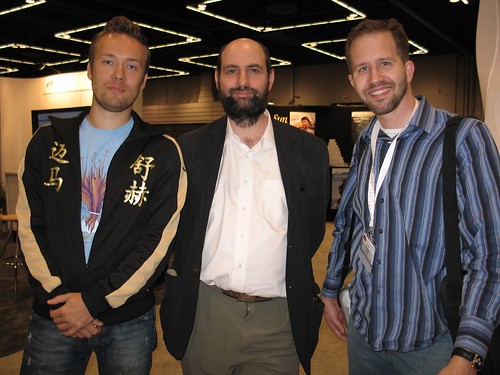 I asked on Twitter today if it was "OK to be a dick as long as you were introspective about it?" I received a few responses, including one asking if I'd be more gender-neutral and pick a word like asshole instead. You can't please everyone. Forgive my language in this instance.
I asked on Twitter today if it was "OK to be a dick as long as you were introspective about it?" I received a few responses, including one asking if I'd be more gender-neutral and pick a word like asshole instead. You can't please everyone. Forgive my language in this instance.
There's a lot of discussion on the Interweb right now about an individual in a technical community who used some imagery in a technical presentation at a technical conference that could be described as gender-insensitive. That's a Politically Correct way to say it. Another way to say it is that a guy used a porn metaphor and soft-core porn imagery in a technical presentation in front of a gender-mixed technical crowd.
Boiled down, the issue ultimately was not just about the images as it relates to gender, but rather that the images and the presentation metaphor was simply in poor taste. Certainly, taste in this context is subjective, but it's easier than you think to find the limits of good taste.
Dana Jones had this very erudite comment on a Rails mailing list:
Imagine a presentation about recruiting developers for your firm with the analogous presentation: "Big Game Hunting", replete with pictures of dead animals smilingly displayed by the hunters who killed them. Hunting is a perfectly legal sport and one which I personally have no objections to (just as I have no objections to porn), but do graphic images that will likely disturb at least *some* audience members really have a place?
What about a presentation about writing code on deadline: "Delivering Like a Birth Mom." Or how about graphic images of up-close breastfeeding in a talk titled "Nursing Your Projects Along."
These parallel theoretical presentations of Dana's brilliantly provide the boundaries of good taste vs. poor taste in this context. "I know it when I see it" is a truism. But with all subjective opinion, one man's norm is another's outlier.
That technical community is discussing the issue and working it out. One of the related posts by DHH, the creator of Ruby on Rails - but not the presenter in question - had an interesting post called "I'm an R-rated individual." It's basically a disclaimer/declaration that he's loud and proud and may offend. Some folks believe Rails.equal?(DHH) but that's of course, short-sighted.
This paragraph of David's post is excellent:
Blending like this isn't free. You're bound to upset, offend, or annoy people when you're not adding heavy layers of social sugarcoating. I choose to accept that trade because my personal upside from congruence is that I find more energy, more satisfaction, and more creativity when the bulls**t is stripped away.
A lot of people are talking about personal brand and "image management" right now, and it's easy to say, "oh, so-and-so is a jerk." and write them off. The reason that paragraph is so insightful is because DHH expresses two things. One, he consciously chooses his path. +1 Wisdom there. And Two, he realizes there are consequences...it "isn't free." +2 Introspection. Like a guy/gal or not, but give them credit for deciding to be someone. Feel bad if someone is a jerk and doesn't realize it. I thinking living consciously and unapologetically is to be commended.
DHH's path is not for everyone. It's not for me. I believe one should avoid being overtly offensive whenever possible and appropriate, public or private. I expend a some amount of effort being a consensus builder (perhaps because I'm an ENFJ and DHH is, I'm guessing, likely an ENTP) and I think one can be real without being rude. I encourage others to do the same.
However, it depends on what you feel strongly about and if what you feel strongly about outweighs what you believe others might feel. You need to be yourself, but you there ARE social norms, and others feelings, that should be considered.
@mstum on Twitter said: I'd rather have honest f-bombs than gentlemen hypocrites... Honest and direct people are so much easier to work with.
But can't one be an honest gentleman? Why is online (or offline) use of the F-word and general crassness somehow exemplary of "honesty?" If someone swears and slams their hand on a table in a business meeting I don't immediately think "Whew, finally an honest person!"
Being generally pleasant and helpful isn't sugarcoating, it's being pleasant and helpful.
@David_Ing said: Different worlds I guess. Reminds me of high school. Makes me feel old. Edgy douche is the new cool.
So where does it stop?
I had this conversation with Ade Miller on Twitter:
This may be a generation gap. I'm in my mid-30s and "social internet culture" for me doesn't automatically involve ending online arguments via reductio ad Hitlerum (Godwin's Law). Young people today (get off my lawn!) are largely more comfortable being unapologetically themselves online. I'm of a slightly older Internet generation that doesn't believe everyone is a unique snowflake and that if everyone behaves with a "this is me, like me or leave me alone" attitude then anarchy (ahem, or the internet) will emerge.
People believe strongly about some things and less strongly about others, and you'll never get everyone to agree. I certainly don't promote being a push-over. If something is an injustice, then, by all means speak up. There are some folks in the .NET community that people consider abrasive or have written off as jerks. But see it from their perspective! For them, there is a great injustice, or a number of them, and social norms be damned! I deeply respect this perspective.
For example, my wife is Black. If I post pictures of my wife on my blog, I risk alienating racists and folks against interracial marriage. However, that's a risk (hopefully small) that I'm willing to take, as I certainly feel strongly about it and I think I'm on the right side of history. I'm also a diabetic and I don't hide it. These are stands, small or large, that I'll take, as they are important to me.
You might knee-jerk and think that's a trite example. You might say "we're all too Politically Correct." This might be a true, but just because you want to avoid being Politically Correct doesn't mean you should email me and say, "Hey, how's your Black Wife? How's Diabetes sucking for you? Still blind?"
A question on code comments showed up on StackOverflow this week, and the most highly-voted answer included the F-word. An "Edit War" ensued, with members of the community switching a code sample back and forth between the actual F-word, and various other forms like F*ck, Frick, and Foolish.
I swear occasionally. I can appreciate the F-word as appropriate punctuation while simultaneously realizing its crassness. I don't typically swear in meetings. It's conceivable I would if I could find the right situation. Most everyone who speaks English realizes that the N-word is off limits. Americans also have other words that we Just Don't Use, although the British do. Using them in a meeting is certain death.
The point is that NOT using these words doesn't fundamentally make my life worse. DHH says:
"I find more energy, more satisfaction, and more creativity when the bulls**t is stripped away."
I respect that, and good for folks who agree. I respect everyone's right to say what they like.
If you're a nudist and you give your technical talks on C# naked, I likely won't be there to watch your talk. You may feel REALLY strongly about nudism, and I wish you well. You may believe in the legalization of drugs and prefer to give your technical presentations high, and I say, kudos, but I and others may not show.
There are some social norms, and you should know what they are and know how strongly you feel about them when you take your message to a larger audience. Know that there are consequences when what you value is broadcast in a larger context while promoting a technology. I've lost readers who have said I don't do enough deep technical content, or they find my "intensely personal" posts off-putting, but I'm conscious of my decisions and I feel strongly about the things I choose to discuss on my blog.
I respect DHH's perspective and others like him. Some are concerned that some edgy attitudes are preventing female programmers from embracing programming as a vocation. DHH says:
"You certainly have to be mindful when you're working near the edge of social conventions, but that doesn't for a second lead me to the conclusion that we should step away from all the edges. Finding exactly where the line goes — and then enjoying the performance from being right on it — requires a few steps over it here and there."
Again, another paragraph with layers. He knows where the edge is, enjoys dancing on the precipice jumping back. To dismiss him as merely loud and obnoxious is to do him (and people like him) a disservice.
I have set a level of what I consider reasonable professional conduct both online and offline. You should too. Know what THE edge is, know what YOUR edge is and know the effects of being near both. Decide what you feel strongly about and what you don't. Not everyone has the same norms, but everyone should know what the consequences are and measure them according to their own value system.
The advice that works for me is to avoid giving bile a permalink. Don't be a dick. If you are a dick, you don't get to complain when things go bad for you. There are consequences to all actions and they live on. They live on longer if you give them a permalink.
What do you think?
Hosting By

 My one-hundred-and-sixtieth podcast is up. In this episode Scott talks to Joshua Marinacci from Sun, a Staff Engineer working on JavaFX. JavaFX, along with Flash and Silverlight battle to be The VM for the Web. We chat about how JavaFX approaches things and muse on who will win the web.
My one-hundred-and-sixtieth podcast is up. In this episode Scott talks to Joshua Marinacci from Sun, a Staff Engineer working on JavaFX. JavaFX, along with Flash and Silverlight battle to be The VM for the Web. We chat about how JavaFX approaches things and muse on who will win the web.







%20-%20Windows%20Internet%20Explorer_thumb_bca1d45d-3fef-415f-93a0-09ae5991414e.png)
%20-%20Windows%20Internet%20Explorer%20(2)_thumb_681370cf-cf04-4da8-9f5b-6919415f728d.png)
![Error System.ArgumentException [5] - Windows Internet Explorer Error System.ArgumentException [5] - Windows Internet Explorer](https://images.hanselman.com/blog/WindowsLiveWriter/ce040f70cb50_D9A9/Error%20System.ArgumentException%20%5B5%5D%20-%20Windows%20Internet%20Explorer_thumb.png)